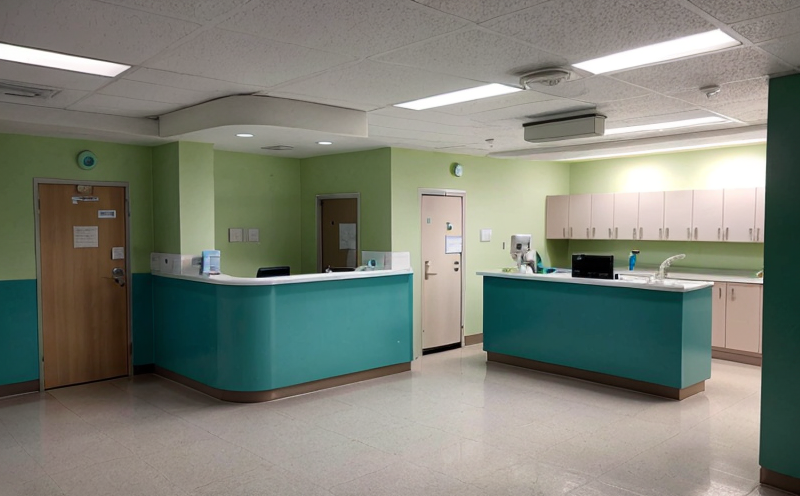JP Endotoxin Testing in Pharmaceutical Products for Hospitals
The Japanese Pharmacopoeia (JP) is a critical regulatory document that sets standards for pharmaceutical quality and safety. JP endotoxin testing specifically targets the presence of endotoxins, which are bacterial toxins derived from gram-negative bacteria. These toxins can cause severe reactions if they enter the bloodstream during medical procedures or through contaminated drug products. This section focuses on the importance and specific aspects of performing endotoxin tests in pharmaceuticals intended for use in hospitals.
Endotoxins play a crucial role in ensuring that hospital-grade medications are not only effective but also safe. Hospitals have stringent hygiene standards to prevent infections, and any contamination by endotoxins can lead to adverse patient outcomes. JP endotoxin testing ensures compliance with these high standards, thereby enhancing the reliability of pharmaceutical products used within hospitals.
The process involves several key steps: sample preparation, inoculation into a chromogenic substrate, incubation under controlled conditions, and finally, the measurement of any liberated chromogen that indicates the presence of endotoxins. The testing is typically carried out using the Limulus amebocyte lysate (LAL) test, which is sensitive to endotoxin levels as low as 0.1 EU/mL.
Accurate and consistent results are paramount in this context. Laboratories must adhere strictly to the procedures outlined in the Japanese Pharmacopoeia to ensure that the tests are reliable and reproducible. This includes using calibrated equipment, maintaining strict laboratory conditions, and adhering to quality control measures throughout the testing process.
The implications of endotoxin contamination extend beyond just the safety aspect; it can also impact the efficacy of pharmaceuticals. Contaminants like endotoxins may interfere with drug delivery systems or reduce the overall effectiveness of the medication. Therefore, ensuring that pharmaceutical products meet the stringent requirements set by the Japanese Pharmacopoeia is essential for maintaining patient safety and trust in medical treatments.
In summary, JP endotoxin testing ensures that hospital-grade medications are not only effective but also safe from contamination. This testing process plays a vital role in upholding the quality standards required in the pharmaceutical industry to protect patients and enhance therapeutic outcomes.
Why It Matters
- Enhances Patient Safety: Ensures that hospital-grade medications are free from harmful contaminants like endotoxins, reducing the risk of adverse reactions.
- Safeguards Compliance: Adheres to international standards such as Japanese Pharmacopoeia, ensuring regulatory compliance and avoiding potential legal issues.
- Improves Therapeutic Outcomes: Ensures that medications are effective without being compromised by contaminants, leading to better patient recovery rates.
The importance of JP endotoxin testing cannot be overstated. By adhering to these stringent standards, pharmaceutical manufacturers can ensure the safety and efficacy of their products, thereby contributing significantly to the overall quality care in hospitals.
Eurolab Advantages
State-of-the-Art Equipment: Utilizing advanced LAL testing systems that provide precise and accurate results. Our equipment is regularly calibrated and maintained to ensure optimal performance.
Experienced Professionals: Our team comprises highly skilled scientists with extensive experience in conducting endotoxin tests. They are well-versed in the latest techniques and best practices, ensuring reliable outcomes.
Comprehensive Reporting: Providing detailed reports that include all relevant test parameters, results, and interpretations. This ensures complete transparency and facilitates informed decision-making by stakeholders.
Strict Compliance: Ensuring adherence to the Japanese Pharmacopoeia and other international standards, guaranteeing consistent quality across all tests.
Use Cases and Application Examples
| Use Case | Description |
|---|---|
| Hospital IV Solutions | Ensuring that intravenous solutions are free from endotoxins to prevent septic reactions during administration. |
| Sterile Drug Delivery Devices | Testing devices used in delivering sterile medications to ensure they do not introduce contaminants into the patient’s system. |
| Catheter and Invasive Medical Devices | Verifying that these devices are free from endotoxins to prevent infections during use. |
- Hospitals: Hospitals require a high level of sterility in all medical supplies, making endotoxin testing critical for ensuring patient safety.
- R&D Engineers: Ensuring that new drug formulations and delivery systems are free from contaminants is essential to prevent failures during development.
The following examples illustrate the practical application of JP endotoxin testing in various scenarios within hospitals:
- Maintaining sterility in infusion fluids and ensuring they do not cause adverse reactions when administered intravenously.
- Verifying that catheters and other invasive devices are free from endotoxins to prevent infections during use.
The stringent testing requirements set by the Japanese Pharmacopoeia ensure that all medical products used in hospitals meet the highest standards of safety and efficacy, contributing significantly to patient care and overall hospital operations.





